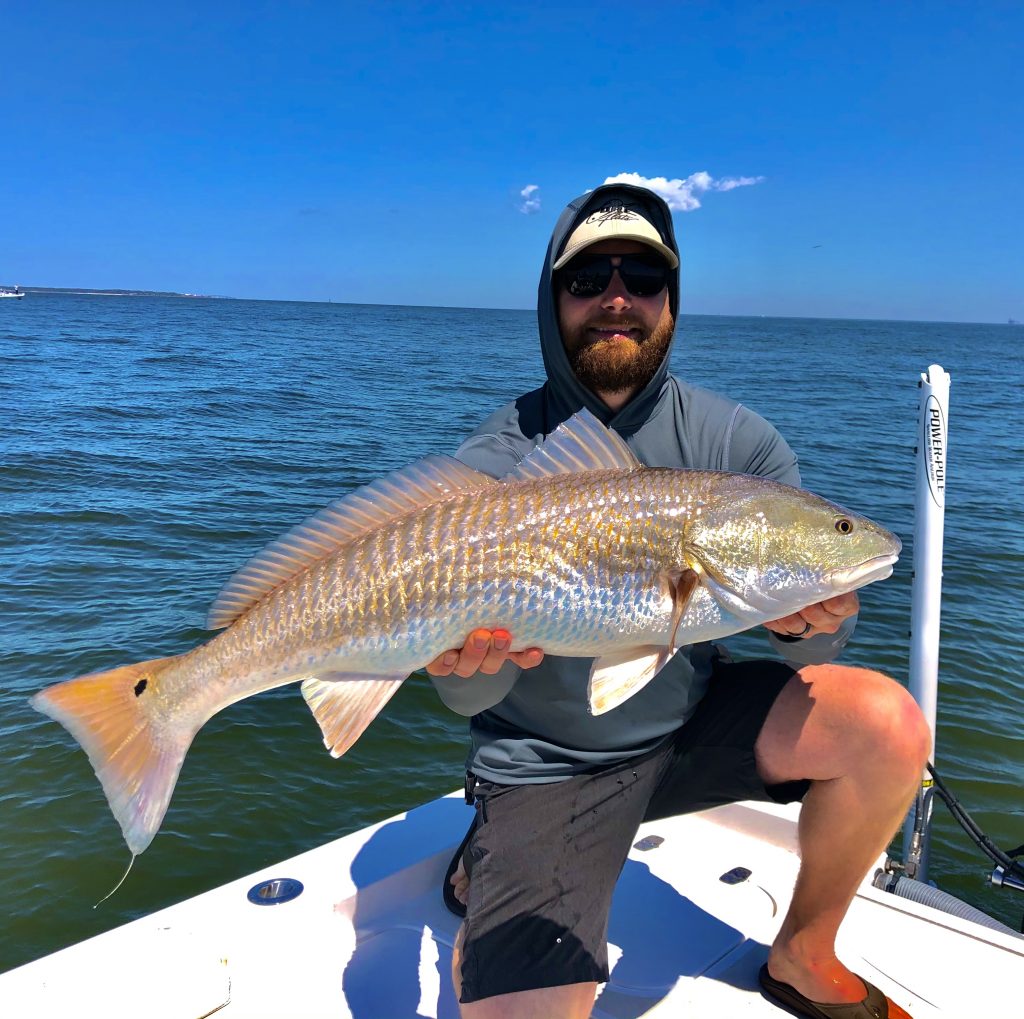When it comes to making plans which work to solve problems and improve life, there’s nothing like having good, solid, verifiable information. This is particularly true when it comes to making plans and regulations for fishing, which requires scientists, government officials and private citizens to work together. This kind of information gathering work on Alabama’s inshore fisheries has been done, through fish tagging, by a combined effort of private guides and anglers, educational agencies. That includes the Dauphin Island Sea Lab, the University of South Alabama and concerned groups of citizens with the Coastal Conservation Association.
Together these hard-working and dedicated folks through the “Tag Alabama” program have gathered some excellent information about Alabama’s fish, the effects of recreational angling and survivability of caught fish, and statistics which can help people make good, valid recommendations for those who make season and size limits.
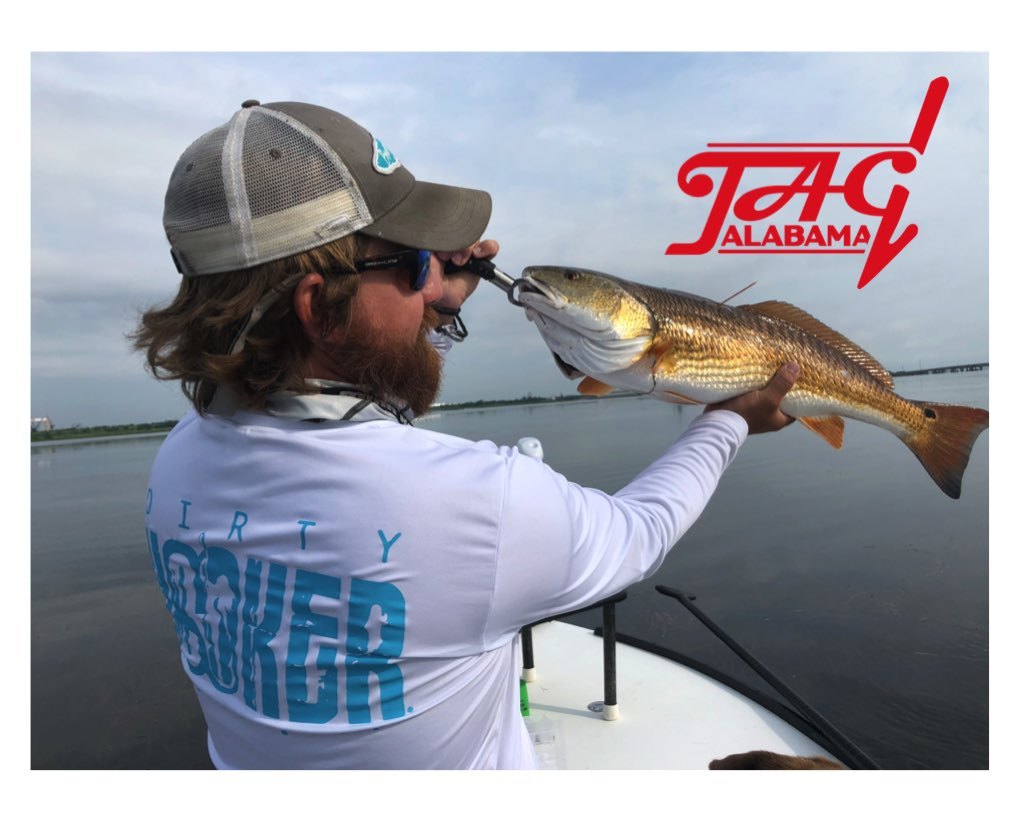
Three people, who represent the three parts of Tag Alabama’s effective fish tagging and data collection, tell us about what has been done, what is going on right now, and what is planned for the future of fish tagging in Alabama.
Captain Richard Rutland is a fishing guide and fish tagger who has been very influential in the development of the tagging program. Crystal Hightower is the Senior Research Laboratory Manager at the Dauphin Island Sea Lab and Blakely Ellis is the executive director of the Alabama Coastal Conservation Association. These folks have worked closely together and with other professionals and non-professionals in starting and developing the Alabama tagging program. These dedicated citizens can give a lot of information about the tagging program and why other folks can step up and do their part to increase knowledge of our inshore fishery.
Richard Rutland
One of the first guides to join the efforts of Tag Alabama is Captain Richard Rutland. Rutland fishes the Mobile Bay system extensively, and during the course of the year, he tags hundreds of fish.
He can tell us a lot about the day in, day out activities involved with properly tagging, recording, and safely releasing fish.
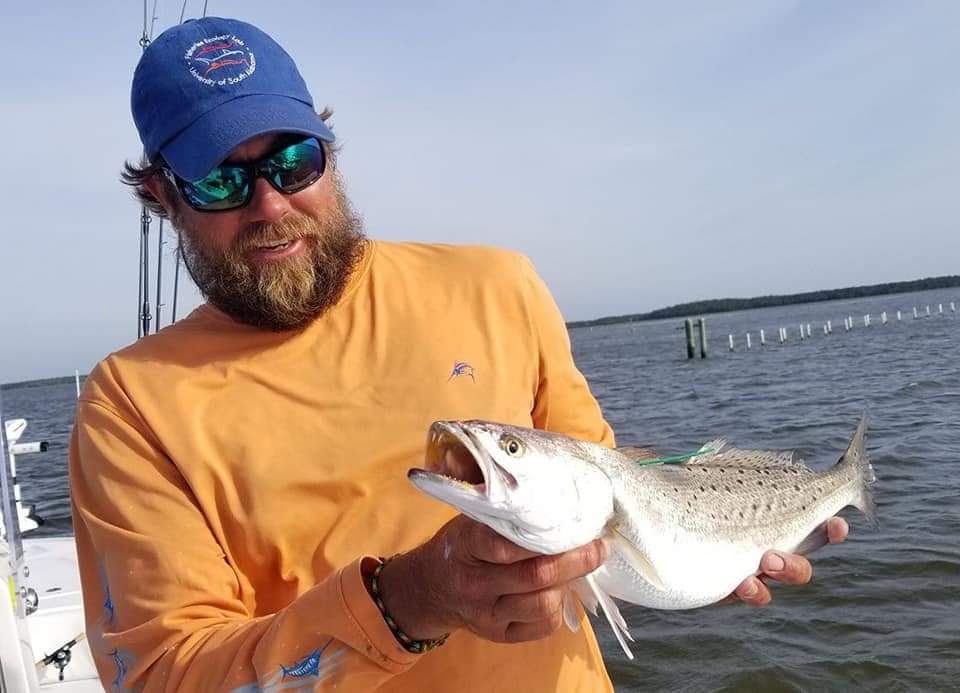
“I feel like I helped pioneer this thing with Crystal and the Sea Lab and then getting Blakely and the CCA involved, which is great. I am becoming efficient at doing this. I’m tagging 400-plus fish a year,” Rutland said. “And one thing that helps me be efficient and quick at it is on my tagging kit. I already have a tag loaded in the needle, and I’ve got two needles, so I’ve got one for redfish that I only do redfish with and one I only do trout with. Heck, I’ve got another needle I do bull reds with and I’ve got them all loaded up. I’ve already got the tag number written down in my book, so all I have to do is pop the fish with a tag, get a measurement on it, and then ‘boom’, it’s right overboard. All I have to do is remember the length, the location, and that I caught the fish, and then I pull out another tag, put it in the needle, write the tag number, and then I’m ready to go.”.
“With tagging speckled trout, you’re talking about condensing that amount of time a fish is out of water to seconds. You need to handle that speckled trout with care,” Rutland added.
“When you get a tagging kit, it’s really important that you pay attention to how you tag the fish. When you tag a fish, you have to pass the midline of the fish with the barb so that you can lock that tag in. If the fish is just superficially tagged in the muscle, that fish can push the tag out by rubbing up against stuff,” he said.
Crystal Hightower
As the Senior Research Laboratory Manager of the Dauphin Island Sea Lab, Crystal Hightower heads a crucial element of the entire Tag Alabama program. In conjunction with the University of South Alabama, the Sea Lab coordinates the collection, recording, and analysis of information generated by the field tagging and recollection of tagged fish.
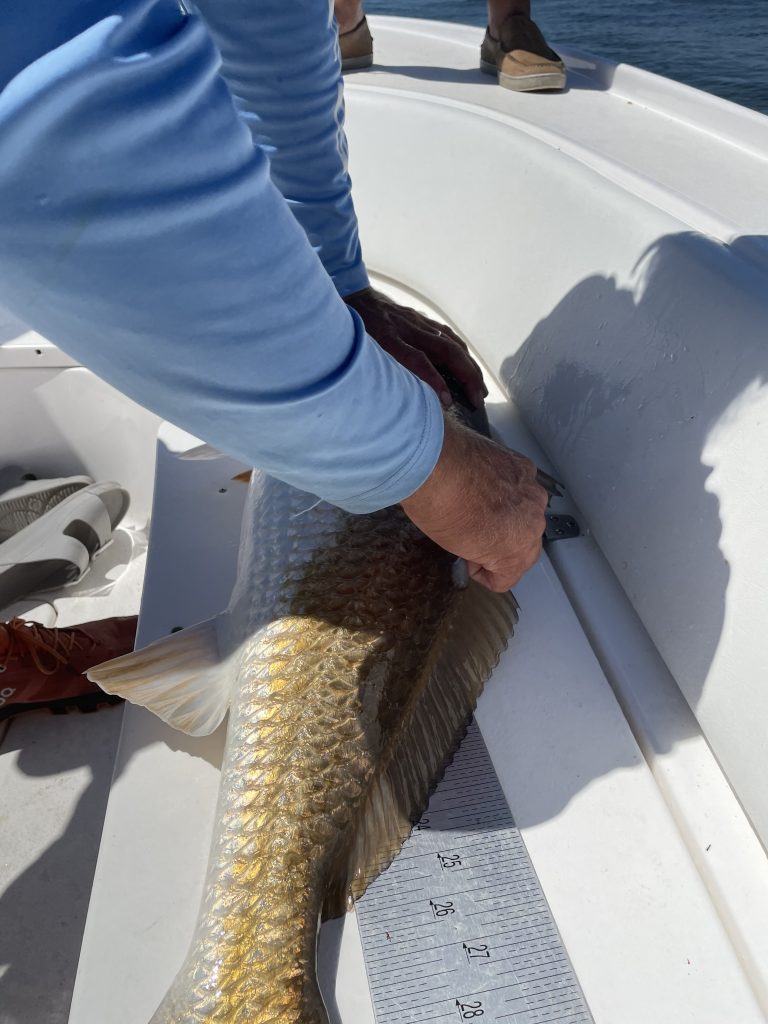
“Last year we were able to continue our work safely, and we got a lot of great science done. We finished our offshore survey, we worked with our inshore surveys, and we kept Richard Rutland doing a lot with Tag Alabama. We’re ready to get going in 2021,” Hightower said.
“There are many different tools that we can use in fishery science, and our main goals of the external tagging and studies of fish is primarily to learn more about the ecology of the fishes, and mainly about their movements around coastal Alabama. With enough data, we could provide information that can be used by the states to better manage these fisheries through either local studies of growth or estimates of fishing mortality,” she said.
“When it comes to fisheries management, the more data that we can put in there that we know are real numbers, they’re not modeled data, so we know the uncertainty around that data is very small. When we have anglers doing this tagging, we know these are real numbers,” Hightowed added. “Our main consideration with this work with Tag Alabama relies on anglers to tag the fish and tag them properly. That tagged fish hanging on to the tag throughout its lifetime is super-important in how the program works.”
Proper tagging of fish for the Tag Alabama program is critical. Hightower sais that one of the most frequent comments that we get from taggers at the first workshop is, “I thought I knew how these tags worked. But I didn’t, really. I didn’t realize that you have to go past the midline of the fish so that the tag will lock in.”
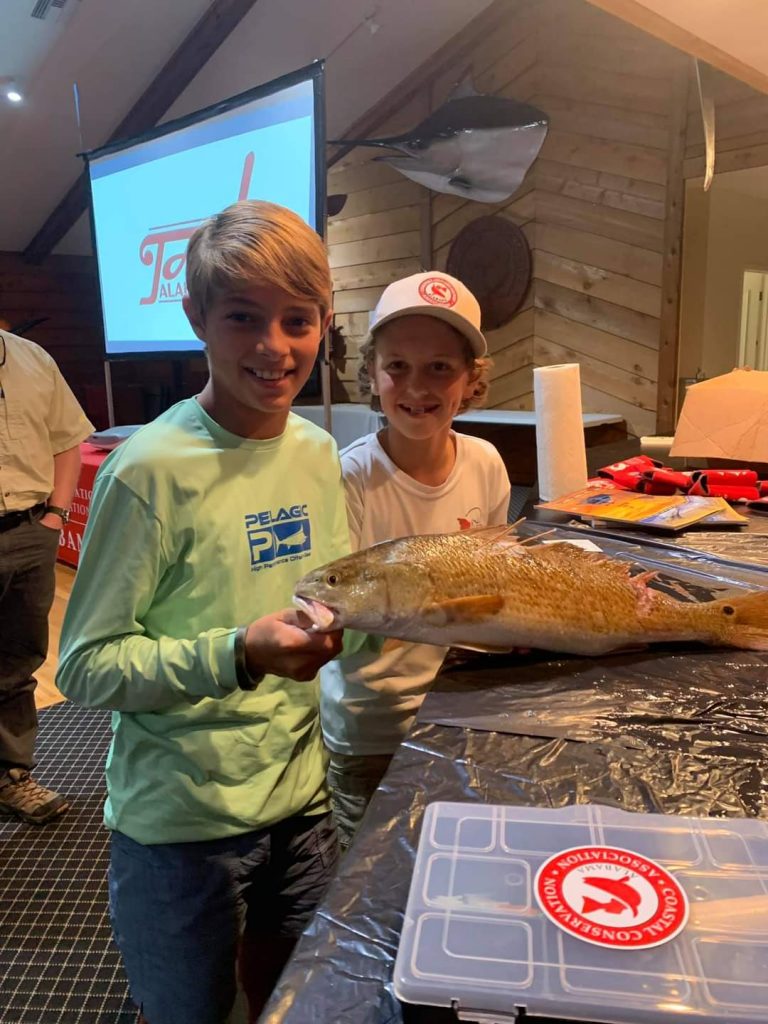
Blakeley Ellis
The Tag Alabama redfish and speckled trout program is sponsored by the Coastal Conservation Association of Alabama, and they provide funds for the materials and operation. This program receives much of its funding from the sales of CCA specialty vehicle license tags, and when a driver buys a CCA tag when renewal time comes around, their tag fees really go a long way to support this vital program.
Anglers who are members of CCA are automatically eligible to take part in the Tag Alabama program, and there’s a training session- either in person or online- to demonstrate how fish can be safely tagged, how to keep and maintain data from the fish, and how to submit data to the folks from South Alabama so the information can be entered into the program’s data base. There are annual contests for anglers who have tagged the most fish and there are categories and rewards for professional guides and for non- professional anglers.
“CCA Alabama helped to develop and launch the TAG AL Recreational tagging program. We modeled it after the very successful TAG Louisiana recreational tagging program that CCA Louisiana has helped out with for a long time. We cover the cost of the tagging kits, tags, tag needles, seminars, recaptured fish reward fulfillment, sending out the hats or shirts for angler who catch and report a tagged fish,” says CCA Alabama Executive Director Blakely Ellis.
“The two requirements for taking part in the Tag AL program are simple. You must be an active member of CCA ($35 per year) and the angler must attend a tagging seminar. These take place during the year, and now that in-person meetings are an option, we will start to schedule and hold these seminars through the summer,” Ellis added.
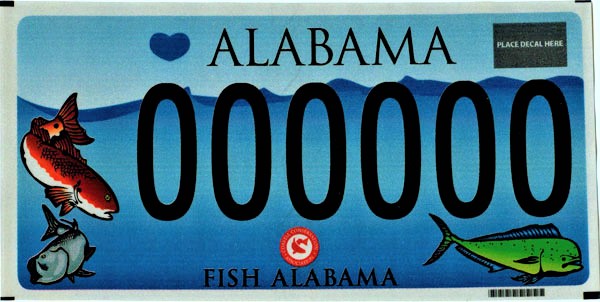
Both the seminars and the tagging program itself cost money, and CCA raises funds to cover the costs through fundraising banquets, donations, and through their saltwater fishing CCA Alabama license plate sales. Forty-two dollars of the fifty dollar cost comes back to CCA Alabama to help them with their conservation projects including the TAG Alabama program.
Important Contact Information
Captain Richard Rutland
Cold blooded Fishing
251-459-5077
Richard@coldbloodedfishing.com
Dauphin Island Sea Lab
101 Bienville Blvd
Dauphin Island, Alabama 36528
251-861-4646
CCA Alabama
25595 Canal Road, Suite 1
Orange Beach, Alabama 36561
251-478-3474
info@ccaalabama.org

